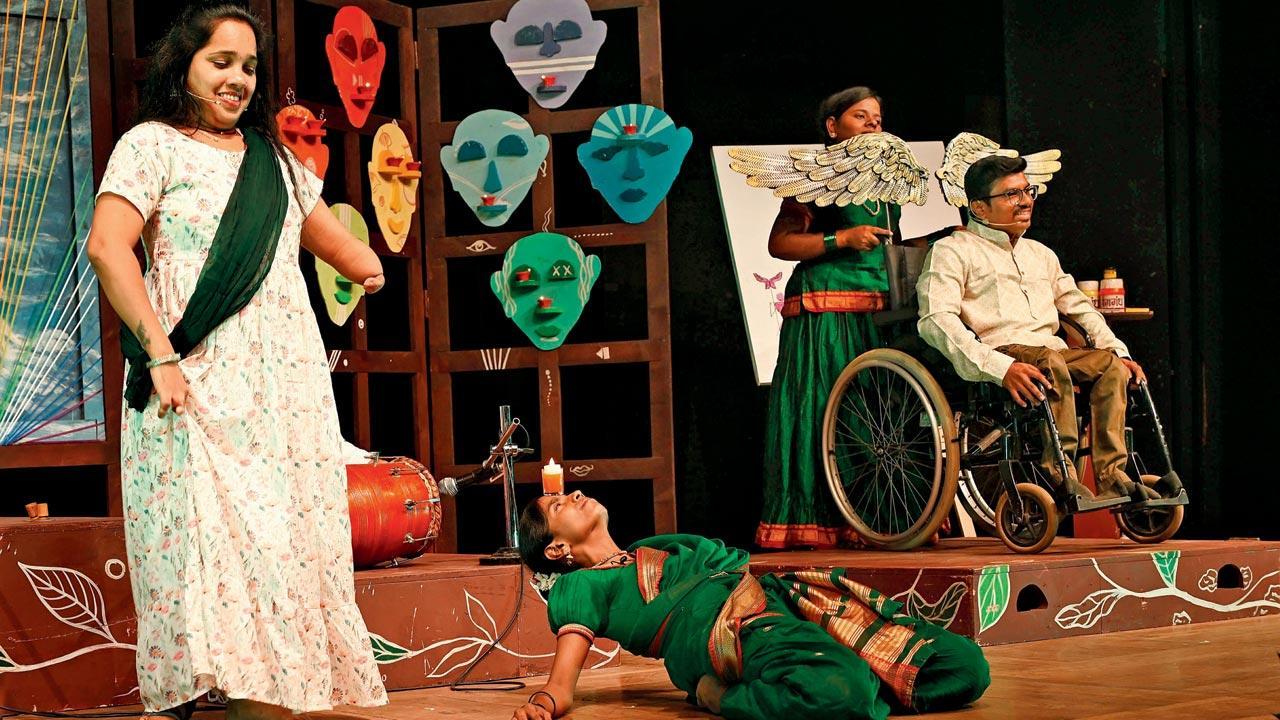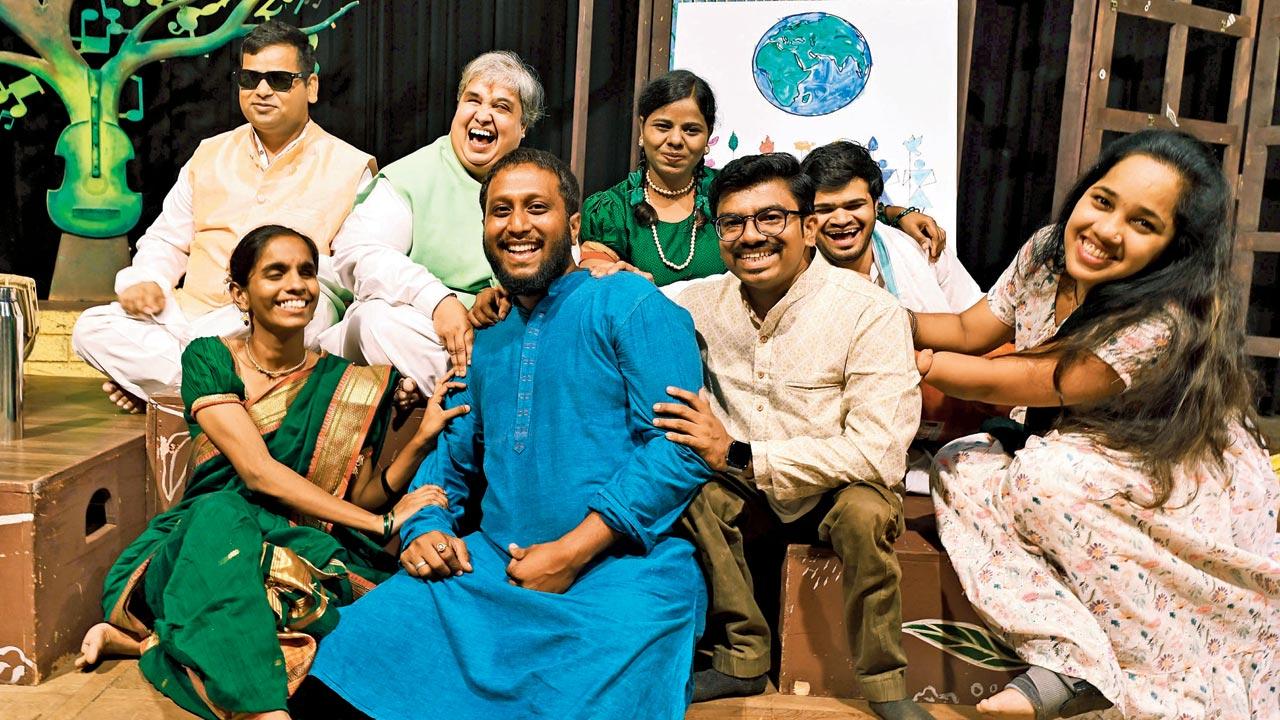A play driven by Persons with Disabilities from Mumbai is set to travel to Dubai to make a case for inclusive theatre, performance spaces, and world

Play RangGandh, which features visually and physically challenged artistes, at Mysore Association Auditorium Matunga
![]() Dhumal man hai toh dhumal jag sara, jeevan ka yeh rang kyon na lage pyara, dhumal dhumal dhumal re...
Dhumal man hai toh dhumal jag sara, jeevan ka yeh rang kyon na lage pyara, dhumal dhumal dhumal re...
ADVERTISEMENT
When a group of Persons with Disabilities (PwD) sang these lines at the January inauguration of Purple Fest Goa 2024, a colourful world of boundless possibilities were manifested by all attendees—abled and differently-abled—irrespective of age, political leaning, social background, race and gender. Suddenly, acceptance and inclusion were in the air and appreciation wore an identifiable colour—it was dhumal (purple), a colour also associated with power, independence and dignity.
I was privy to a defining global moment in the disability rights movement when 13,000 delegates from 17 countries pledged to create opportunities for PwD in a purple world where people are not defined by their physical-mental weaknesses, but by their diverse skills and grit.
Exactly four months later, I was once again treated to the same purple-tinted optimistic world created by an art designer-innovator who was a key contributor to the Purple Fest. I watched the Sumeet Patil-directed Marathi play RangGandh, written by Dr Pranav Prabhu. Literally, the title translates to “colour and fragrance”. But it represents far more. It brings alive a rich, multidimensional tactile and olfactory world in which PwDs navigate with touch, smell and voice. This world is populated by the wheelchair-bound who need assistance, it is characterised by the sightless who need cues and landmarks. But their world is not marked by surrender and self-pity. Instead it roars with gritty laughter and spunk!
 Captures the cast sharing a light moment with director Sumeet Patil. Pic/Kirti Surve Parade
Captures the cast sharing a light moment with director Sumeet Patil. Pic/Kirti Surve Parade
RangGandh is a fun-filled musical experiential tour—a deeply intimate encounter with seven PwDs who play themselves in the 1.25 hour-long drama. RangGandh is a drama within a drama. It revolves around the anxieties and pressures faced by seven actors Prashant Yadav, Yogita Tambe, Pratiksha, Dolas, Jayesh Baniya, Aakansha Wakde, Kavikiran Patil and Jyoti Mastekar.
These artistes are unable to mount a play because of accessibility issues. Devoted actors, but disabled individuals, do not make the cut in the contest. Actors seek a catharsis in sharing their disappointment with the audience.
Despite being sightless, the actors can visualise Lord Vitthal in a unique form, shape and colour. They sense the radiance of a bright morning sun. They are not afraid of the starless night; they have internalised darkness in their consciousness.
RangGandh is a milestone in Sumeet Patil’s personal journey as a stakeholder in disability rights advocacy. The 34-year-old multidisciplinary artist has been working with visually and physically challenged persons for two decades. He was initiated into the world of the disabled (particularly sightless) from the King George school days in Dadar. After acquiring a post-graduate degree in Applied Art from Rachna Sansad, he started teaching visual arts to the sightless. He recently earned his doctorate in the subject of visual empowerment. He currently guides 3,000-plus disabled students spread across 10 educational institutions in Maharashtra. Four of his past students are part of RangGandh’s cast. In fact,the play is part of his colour-fragrance therapy programme in which he presents an identifiable aroma/scent with a colour, thereby helping the impaired person to draw and paint without assistance. The play includes a live RangGandh demo which enables disabled actors to paint in real-time on stage. While lemongrass aroma leads them to the green colour, frangipani scent guides them to the yellow on the palette, just as the rose essence confirms a bright red offering! The play’s props further underline the philosophy of inclusion—masks representative of all types of disabilities; a landscape painting explained in Braille; a symbolic tree with leaves resembling music notations, most importantly a makeshift ramp which adds a new dimension on stage.
RangGandh advocates accessible theatre; the seven performers are fierce advocates for the rights of the disabled. They underline the collective national shame of not having accessible performance spaces in India. Even after 77 years of Independence and claiming a rich multi-lingual theatre tradition in 15-odd states, why does the nation lack disabled-friendly performance spaces with better toilets, safer restrooms, convenient ramps and assistive technology. Also, when will the conventional stage have Braille signage for the sightless?
Why do designers/builders/architects and civic authorities not think of assisted listening devices, flexible seating, and grab bars for the divyang while creating new facilities? Why are the disabled so low on the priority order? Chief Minister Eknath Shinde inaugurated the annual grand 100th Marathi drama summit at Chinchwad this January, but can the Marathi theatre industry boast of a single accessible auditorium?
“In Western countries, even the crowded tourist destinations have mobility/hearing aids for the impaired; their recreational spaces cater to the needs of the handicapped. The developed world is defined by accessible public transportation offered to people across ages and abilities. In India, things are far from favourable, which is why I want to do my bit to change the scenario,” says Patil, who is now prepping for RangGandh’s21st performance at the International Education Entrepreneur Summit, Dubai. Patilwill travel overseas with the cast, well aware of the logistical challenges. “It will be a joy to be with the seven actors in the Education Sensations event. We want to make a ‘we-can-do-it-together’ statement. I will double up as the sound/lights/costume manager too,” he chuckles, acknowledging the 22 backstage artists who support RangGandh.
Each show is a feat and made possible only with the coming together of allies and advocates. Shreerang Charitable Trust and Rangved have joined hands to make the non-ticketed play viable. Artists from varied disciplines--choreographers (Tanvi Palav, Jyoti Mastekar), acoustic/light/set experts (Shital Talpade, Sunita Ramteke), lyricists (Spruha Joshi), curators and costume designers have pooled in their resources and ideas to enable the stars on stage. Also, tremendous effort goes into finding newer avenues of performance, since the traditional spaces are unaffordable. The play has been performed for varied audiences all over Maharashtra; both in Hindi and Marathi, while retaining the Marathi folk musical flavour through popular numbers. Akansha Wakde’s lavani choreography and playback by Pratiksha Dolas (both visually-impaired) provide an unforgettable highlight in inclusive theatre!
Patil feels RangGandh will turn into a powerful educational tool once it reaches stakeholders in the disabilities spectrum, especially considering that over 30 million people live with seen-unseen physical-mental disabilities. At this point, donations collected from the play’s patrons are being repurposed for furthering the disabilities’ cause. Patil aims to turn the performances into an umbrella platform where the disabled can share experiences/life lessons/ideas, vend craft products/promotional items, lobby for a ramp/toilet/bus seat/ and meet the larger family of friends. In the past, Patil has designed many accessibility tools—radium sticks or stencil outlines for colouring—which help the PwDs in their daily tasks, and these are set to be publicised on the RangGandh stage! Incidentally, Patil’s short 23-minute film, Tarang also dwells on a blind girl struggling in a school for able students. Her pursuit to learn the arts, particularly painting, takes baby steps. The film, underscoring the significance of inclusive education, will soon be screened in the US under the aegis of the North American Film Association.
RangGandh’s script is advocacy-focused, but it can be terser if the crew wish to smoothen the narrative flow. Its strength though, is that the play is a work in progress. The script is improvised after every show, so as to iron out the logistical glitches, and also streamline the content. “Our team asks for suggestions from the usual theatregoer, not necessarily disabled. We want the ideas of inclusion to be shared widely beyond advocacy circles,” says Yogita Tambe, a senior actor who also plays tabla. She feels actors and audience enjoy the play because the latter are not put on a spot. “We don’t play the blame game or criticise common people who are not associated with the movement. We do however, give a gentle reminder to all enablers in the audience about how small actions of help/sensitivity [and not necessarily monetary] can make a big difference.”
The play also recommends that the audience resort to inclusive language in their daily lives. At one point in the play, the actors speak aloud all the objectionable terms that are in currency: Ae andhalya, disat nahi kaa (Hey you blind bat, can’t you see?), “Moorkhbahira, aikat nahi..” (Hard of hearing fool...). Such regressive statements, even if unintentional, undermine the progress of the disability rights movement.
RangGandh is inspiring because it is driven by a poetic pursuit of the natural environment. It begins with Saint Tukaram’s Vrikshavalli Amha Soyari Vanchare, declaring allegiance to a wholesome peaceful human existence that is close to the trees, birds, animals and skies. It looks for simple solutions of coexistence and cooperation that come from nature. The cast seeks solace in the uniting power of the performing arts. They want music and hope in the air, not just for themselves, but for all minorities seeking assimilation.
Sumedha Raikar-Mhatre is a culture columnist in search of the sub-text. You can reach her at [email protected]
 Subscribe today by clicking the link and stay updated with the latest news!" Click here!
Subscribe today by clicking the link and stay updated with the latest news!" Click here!







